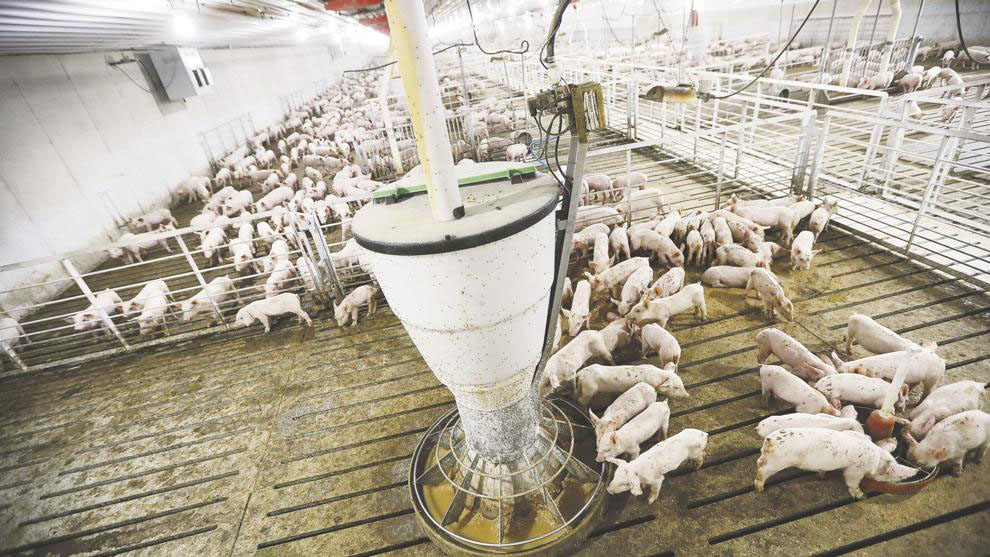The study, released in August, reveals that the 21,000 CAFOs in the U.S. produce up to 1.6 million tons of waste annually. This isn’t just animal excrement but a toxic mix of pharmaceuticals, pesticides, heavy metals and endocrine-disrupting chemicals.
According to the Indiana Department of Environmental Management, Indiana has 1,755 confined feeding operations, 865 of which are CAFOs. Allen County alone houses 12 CFOs, with seven classified as CAFOs.
The report’s authors, Elise Pohl and Sang-Ryong Lee, show that CAFO emissions — including ammonia, methane, volatile organic compounds and particulate matter — contribute to local health crises and global climate change. Their findings echo longstanding concerns voiced by organizations such as the Hoosier Environmental Council, the Sierra Club, and neighbors near these operations, who have been warning of the dangers for years.
This is not speculation. It’s happening.
Kim Ferraro, senior attorney at the Conservation Law Center, has seen the damage firsthand. “This isn’t just pollution — it’s legal pollution,” Ferraro explains. “Waste lagoons leach into our waterways, and it’s perfectly legal under Indiana’s lax regulations.”
One of the most glaring examples of Indiana’s weak approach is its refusal to require National Pollutant Discharge Elimination System (NPDES) permits for CAFOs — a critical tool to ensure compliance with the Clean Water Act. Unlike Indiana, states such as Michigan require nearly 95% of their CAFOs to obtain NPDES permits, providing better oversight and pollution control.
Indiana’s CAFOs, however, operate without this essential check. As Ferraro notes, “The law doesn’t require much, and inspections happen every five years, announced ahead of time. It’s hard to catch violations when the law doesn’t demand much to begin with.” The lack of NPDES permits leaves pollution unchecked and communities suffering the consequences.
Current Indiana law only requires CAFOs to meet basic “CFO approval” standards, but, as Ferraro said, “They’re following weak rules, but that doesn’t mean they aren’t harming the environment.”
To turn the tide, Indiana lawmakers must require NPDES permits for all CAFOs. This isn’t radical — it’s a baseline standard in states that value both agriculture and environmental protection. Since 2011, CAFOs in Indiana are no longer required to obtain NPDES permits for operation unless they directly discharge into a state waterway.
The consequences are clear. Communities near CAFOs report higher rates of respiratory illnesses, kidney disease and infant mortality. Workers, often low-income or immigrants, are exposed to toxic gases and suffer from chronic health conditions.
Meanwhile, Indiana’s legislature continues to prioritize corporate interests. Why? Because CAFOs are a cash cow:
Pork production in 2023: $1.48 billion
Dairy in 2023: $961 million
Eggs in 2022: $1.8 billion
Cattle and calves in 2023: $595.3 million
From family-run farms to corporate giants, agriculture’s value to Indiana is undeniable. But this doesn’t justify the state’s status as a haven for polluters. Hoosiers should reject this notoriety. Setting more robust air and water standards — particularly through mandatory NPDES permits — would be a crucial first step.
“Requiring NPDES permits would subject these massive operations to real scrutiny, forcing them to implement stronger pollution controls and protecting our waterways from catastrophic spills,” Ferraro told The Journal Gazette.
Spills happen. In June, a fertilizer leak in Tippecanoe County caused a fish kill in Flint Creek, which feeds into the Wabash River. A 2010 spill dumped 232,000 gallons of hog manure into Beaver Creek, killing 100,000 fish. In 2009, a hog CAFO dumped 4.5 million gallons of waste into the Mississinewa River.
Meaningful change will require lawmakers to carefully balance the needs of the agricultural industry with protecting public health and the environment. Implementing NPDES permits for CAFOs would demonstrate that Indiana is committed to safeguarding its natural resources and communities. As we’ve seen in other industries, prioritizing corporate profits over responsible regulation can create disastrous results.
Without such measures, Indiana risks further environmental damage and the associated health impacts on Hoosiers.
As Ferraro aptly put it: “The law has to change.”


